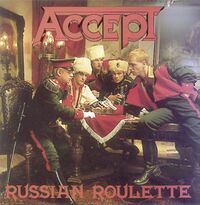Mutually exclusive events
Mutually exclusive events are events which exclude each other, mutually. They differ from mutually inclusive events in that they are exclusive rather than inclusive. Moreover, mutually exclusive events are exclusively exclusive; if both events are not exclusive, they cannot be considered mutually exclusive. A clear example is the set of outcomes of a round of Russian Roulette, which can result in either death or a large sum of money, but not both (unless you have good life insurance, of course).
In the above example, both outcomes are collectively exhausting, because even if you win, the image of a fellow man blowing his own brains out in the pursuit of monetary gain will be etched into your mind for the remainder of your wretched existence, and I can't imagine that he'll be having a particularly good day afterwards either. However, not all mutually exclusive events are collectively exhausting, as you could always pop to the loo for a bit to skip your turn. Both popping to the loo and dying are mutually exclusive, but at least one of them provides an escape from your acute gonorrhoea.
History[edit]
Throughout most of human history, mutually exclusive events did not exist, simply because everyone was too dumb, poor, lazy or dead (not mutually exclusive) back then to think of more than one outcome to any given event. During the Stone Age, for example, the only thing that one could do with two rocks was to smash them into each other to make sharper rock; no-one had yet considered the possibility of smashing rocks together at different angles, with different forces or smashing together different types of rock in order to produce different outcomes, because geometry, mechanics and geology were considered niche and taboo. This perception would begin to shift at the start of the Bronze Age, as people began to smash different shiny rocks together. Unfortunately, war would be invented before mutually exclusive events and would stunt any further intellectual forays into the idea for millennia to come, as everyone was now too busy dying.
Invention[edit]
Mutually exclusive events were invented by Galileo Galilei, a mathematician from Italy who lived either in the late 16th or early 17th century, but not both. During this time period, the Catholic Church held significant power over the intellectual pursuits of the people of Italy. When Galilei attempted to publish a thesis on the appropriate positions for lumps of mozzarella to be placed on a pizza, he was met with condemnation from the Church, who considered his theory heretical; his suggestion that lumps should not be placed in the center of the dish directly contradicted the accepted and biblically accurate idea of lactocentricity. When brought before the Roman Inquisition to explain himself, he exclaimed that he wished that he could punch the pope in the face and kick him up his arse simultaneously. Galilei would henceforth be placed under house arrest, but reflecting upon his remarks would lead him to develop the idea of mutually exclusive events into a mathematical concept.
Debate[edit]
Following its invention, Galilei's fellow mathematicians were initially hesitant to accept the idea of mutually exclusive events, citing its apparent lack of applicability to everyday life. War had not yet fallen out of fashion by this time, and so people were still largely preoccupied with killing each other over defining logical contradictions. This debate would continue for centuries until Harry S. Truman, an American mathematician, carried out a demonstration of an application of two mutually exclusive events by dropping an atomic bomb on Japan, stating "If they do not now accept our terms they may expect a rain of ruin from the air, the like of which has never been seen on this earth." In this example, the two outcomes (a rain of ruin from the air or no rain of ruin from the air) are mutually exclusive. This attracted a lot of attention as he performed this demonstration during a World War, making the concept of mutually exclusive events more appealing to the general population as it was now associated with war. This effectively settled the debate, introducing the concept into mainstream mathematics and culture.
In modern mathematics[edit]
Mathematicians, in their infinite wisdom, have come up with several unique ways of taking this extremely simple concept and making it as unintelligible to the general population as possible, by changing all the words into funny letters and symbols which they made up on the spot. The following are REAL examples of mathematical notation for mutually exclusive events, made by REAL mathematicians:
- ¬(Φ^ψ)
- P(A U B) =0 (except the U is upside down???)
- (D1, D2) ≠ (1,1)
The main benefit of describing mutually exclusive events in these ways is to allow these so-called scholars to point and laugh at you when you fail to understand their hieroglyphics. It is easy to feel disheartened in the face of such savage mockery. However, in such a situation, one may take solace in the fact that, in spite of all their qualifications and achievements, studying mathematics and having sexual intercourse are still mutually exclusive events. Hold on to that.



